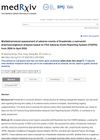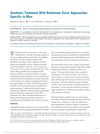 10 citations,
January 2014 in “Indian Dermatology Online Journal”
10 citations,
January 2014 in “Indian Dermatology Online Journal” Most medical students in the study had skin and hair issues, with acne, hair loss, and sun tan being common, and these issues varied by gender and origin.
 10 citations,
August 2002 in “Sexualities”
10 citations,
August 2002 in “Sexualities” The critique suggests that Wilton's work unintentionally supports the very stereotypes it aims to question and calls for a broader, more inclusive approach to understanding gender.
 9 citations,
April 2018 in “Journal of trace elements in medicine and biology”
9 citations,
April 2018 in “Journal of trace elements in medicine and biology” Hair analysis can show nutritional status and environmental exposure, with phosphorus being very stable in hair and differences found based on gender and conditions like depression and autism.
 5 citations,
January 2018 in “International Journal of Trichology”
5 citations,
January 2018 in “International Journal of Trichology” Hair strength is similar across different scalp areas, and not affected by age, gender, or hair thickness.
 3 citations,
August 2019 in “International Journal of Dermatology”
3 citations,
August 2019 in “International Journal of Dermatology” Dermoscopy is useful for diagnosing lichen planopilaris and certain features may relate to disease duration, age, and gender.
 3 citations,
January 2019 in “Dermatology and therapy”
3 citations,
January 2019 in “Dermatology and therapy” Scalp massages may help stabilize or regrow hair in people suffering from hair loss, regardless of age, gender, or use of other treatments.
1 citations,
March 2021 in “Frontiers in Medicine” Female pattern hair loss shows similar characteristics in both genders and should be classified by hair loss patterns, not gender.
 August 2024 in “medRxiv (Cold Spring Harbor Laboratory)”
August 2024 in “medRxiv (Cold Spring Harbor Laboratory)” Finasteride has various adverse effects, including sexual dysfunction and mental health issues, which vary by age and gender.

Certain drugs, especially those for eyes, bacterial infections, imaging tests, and skin conditions, are more likely to cause itching, with differences seen across gender, age, and weight.
 April 2023 in “Journal of Investigative Dermatology”
April 2023 in “Journal of Investigative Dermatology” People with Lichen sclerosus are more likely to have skin conditions like vitiligo and alopecia areata, heart disease risks, and other health issues. They should be checked for these, but screening plans shouldn't differ based on gender due to lack of data.
 November 2021 in “Research Square (Research Square)”
November 2021 in “Research Square (Research Square)” The research found that COVID-19 survivors experienced long-term effects like anemia and hypertension, with age and gender being important factors, but race, income, and education had little to no impact.
 January 2016 in “Journal of the turkish academy of dermatology”
January 2016 in “Journal of the turkish academy of dermatology” Acne was the most common skin problem in kids, with other conditions like warts and eczema also frequent, varying by age and gender.
 July 2003 in “Journal of Cutaneous Medicine and Surgery”
July 2003 in “Journal of Cutaneous Medicine and Surgery” The document concludes that various treatments for skin conditions are effective, but some require further research, and certain factors like gender and lifestyle can influence disease outcomes.
 March 2021 in “The British Journal of Psychiatry”
March 2021 in “The British Journal of Psychiatry” Countries with stricter cultures had fewer COVID-19 cases and deaths, paranoia is linked to false memories, psychosocial intervention works as well with or without antipsychotic drugs for young people with psychosis, smartphones can detect changes in behavior indicating illness relapse, and recruitment agents show regional and gender biases.
88 citations,
September 2003 in “Clinical endocrinology” Hormone treatment for transsexual individuals is effective but carries risks like thromboembolic events and mood changes, with most side effects being minor and reversible.
 86 citations,
May 2013 in “American journal of obstetrics and gynecology”
86 citations,
May 2013 in “American journal of obstetrics and gynecology” Gynecologists should provide comprehensive care for transgender patients, including mental health evaluation, hormone therapy, and surgical options, while monitoring for side effects and ensuring patient safety.
 37 citations,
April 2010 in “FEBS Letters”
37 citations,
April 2010 in “FEBS Letters” The study concludes that the EDA2R gene is activated by p53 during chemotherapy but is not necessary for chemotherapy-induced hair loss.
 13 citations,
March 2016 in “Progress in Transplantation”
13 citations,
March 2016 in “Progress in Transplantation” Healthcare providers need better understanding and cultural sensitivity to improve care for transgender patients with kidney failure needing transplants.
 10 citations,
February 2016 in “The Journal for Nurse Practitioners”
10 citations,
February 2016 in “The Journal for Nurse Practitioners” Healthcare providers need better education and resources to give competent and sensitive care to transgender patients.
 5 citations,
April 2007 in “Popular Communication”
5 citations,
April 2007 in “Popular Communication” Makeover TV shows promote unrealistic beauty standards and pressure women to conform to societal ideals.
 1 citations,
February 2017 in “Journal of Aesthetic Nursing”
1 citations,
February 2017 in “Journal of Aesthetic Nursing” Men are getting more beard transplants to look better and follow fashion trends.

Bilateral Orchiectomy effectively reduces the need for anti-androgen medication in most transgender females.
 November 2021 in “Research Outreach”
November 2021 in “Research Outreach” Low testosterone levels may lead to more severe COVID-19 outcomes.
 185 citations,
August 2020 in “Mayo Clinic Proceedings”
185 citations,
August 2020 in “Mayo Clinic Proceedings” Men are more likely to have severe COVID-19 cases and fatalities than women due to factors like lifestyle, aging, and biological differences.
 8 citations,
October 2017 in “Dermatologic Surgery”
8 citations,
October 2017 in “Dermatologic Surgery” Men need higher doses and tailored injection techniques for botulinum toxin treatments due to their unique facial features.
 1 citations,
January 2020 in “Elsevier eBooks”
1 citations,
January 2020 in “Elsevier eBooks” Hormone therapy is safe and effective for transgender adults, but requires regular monitoring and mental health support.

Older people tend to have higher biotin levels, which are weakly linked to certain blood components and negatively linked to triglycerides; biotin should be checked in patients with high triglycerides or medication-related skin issues, and only supplemented if deficient. Vitamin D and folate deficiencies are linked to specific skin conditions.

The document concludes that activating hair roots is important for improving hair growth and preventing hair loss.
 January 2012 in “S. Karger AG eBooks”
January 2012 in “S. Karger AG eBooks” The document concludes that transsexual individuals often experience improved quality of life after transitioning, despite higher risks of psychiatric issues and mortality.
162 citations,
October 2014 in “Autoimmunity reviews” Alopecia areata is caused by the immune system attacking hair follicles.



























